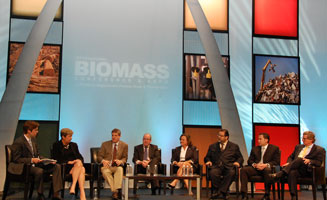 All energy of the bio variety – biomass, biogas, biodiesel and biofuels – were represented at the 4th International Biomass Conference and Expo on Monday during a panel featuring executives of seven different industry organizations.
All energy of the bio variety – biomass, biogas, biodiesel and biofuels – were represented at the 4th International Biomass Conference and Expo on Monday during a panel featuring executives of seven different industry organizations.
Moderator Tom Bryan, Vice President of BBI International, asked the panel was what the top priorities for their organizations are this year.
“Just getting parity for algae,” said Algal Biomass Organization Executive Director Mary Rosenthal. She says they are also working on educating lawmakers about algae and keeping the funding they currently have for development from departments of energy, agriculture and defense.
Charlie Niebling with the Biomass Thermal Energy Council said they would like to see thermal incorporated into a true federal Clean Energy Standard. “We still face real challenges in just making sure people understand the role that thermal plays in addressing energy challenges in our country,” he said.
Biomass Power Association CEO Robert Cleaves says they support the development of a federal Clean Energy Standard as well and they want to retain the USDA Biomass Crop Assistance Program (BCAP). “BCAP for existing facilities may be the only game in town as a bridge to somewhere,” he said.
Inclusion and parity are also important for biogas, as well as working on a fundamental change in waste management. “Discontinuing policies that simply take all this organic matter, put it in a hole in the ground and create environmental issues. Instead we need to create policies to divert that to higher, better and multiple uses.” said Norma McDonald of the American Biogas Council.
For members of the Renewable Fuels Association, president Bob Dinneen says what is most important is education and certainty. “We’re looking at a situation where our tax incentive expires the end of this year,” Dinneen said. “What we’re trying to do is get to some reform of the existing incentive that reflects the fact that the industry has indeed grown, that will allow the industry to continue to grow and evolve, but do so in response to fiscal realities in Washington DC now.”
“The biodiesel industry is an example of what can happen when you have total policy failures in Washington DC,” said Joe Jobe with the National Biodiesel Board, referring to the non-renewal of the biodiesel tax for a year that caused many plants to shut down. Jobe says the industry is going strong again and plants are re-opening but they would like to see the tax credit extended again at the end of this year. “We just need a little more time to get a little more mature.”
Finally, Advanced Biofuels Association president Michael McAdams stressed the importance of keeping the Renewable Fuels Standard in place. “The RFS2 is the single most important public policy in the United States for first, second and third generations biofuels,” he said.
Listen the panel talk about priorities here: Biomass Conference Panel

